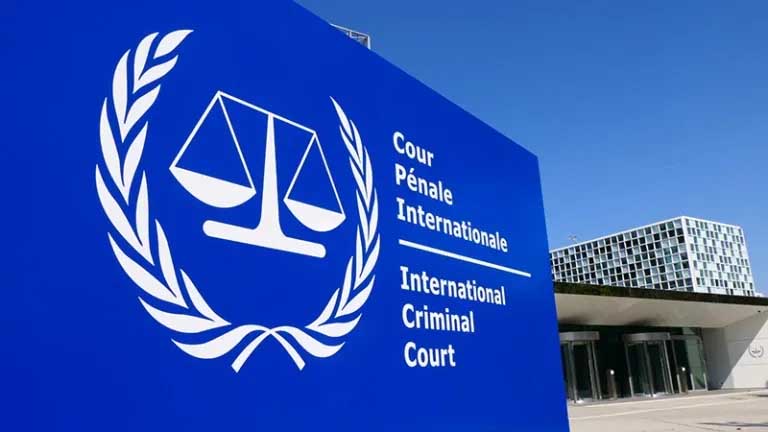Harsha Kakkar
Last weekend, the US House of Representatives approved a bill called the ‘Illegitimate Court Counteraction Act’, which aims to impose sanctions on the International Criminal Court (ICC). This legislation intends to freeze assets and restrict visas for foreigners who have materially or financially supported the court’s efforts to ‘investigate, arrest, detain, or prosecute a protected person.’
According to the bill, a ‘protected person’ encompasses all current and former military and government officials from the United States and its allies who have not consented to the court’s jurisdiction, including nations like Israel. The bill appears aimed at penalizing the ICC for issuing arrest warrants against Israeli Prime Minister Benjamin Netanyahu and Defense Minister Yoav Gallant.
The warrant also named Palestinian Mohammed Deif, who has since been eliminated by Israel. Once the deaths of other Palestinians targeted by the ICC were confirmed, those warrants were rescinded. These warrants were originally issued in November of last year. The United States is particularly irked by the ICC’s decision to place Israeli and Palestinian leaders on equal footing.
A previous attempt to sanction the ICC was unsuccessful last year due to opposition from Democrats, including President Biden. The current objective is to pass the bill through both houses of Congress, which are under Republican control, in order to have it signed by incoming President Donald Trump when he takes office on January 20. Trump has a record of strong pro-Israel policies, including moving the US embassy to Jerusalem during his previous administration, which sent a clear message.
The US has consistently criticized the ICC and is wary that the court may one day investigate them if allowed to operate unchecked. Countries like the US, Russia, China, and India have neither signed nor ratified the 1998 Rome Statute, which established the ICC, while nearly all European nations have ratified the statute and would be obligated to detain Netanyahu or Gallant if they set foot on their territory.
During his presidency in 2020, Trump threatened to initiate economic and legal actions against the ICC if it pursued investigations into US war crimes in Afghanistan, which primarily involved American troops. Trump also sanctioned the ICC’s former prosecutor, Fatou Bensouda, applying a travel ban and asset freeze for initiating investigations into US personnel in Afghanistan. Biden later overturned this ban.
In 2020, the US government indicated it would not only sanction ICC members but also impose visa restrictions on their families. US leaders additionally warned of potential corruption investigations against the institution, claiming this was the ‘first step in holding the ICC accountable for exceeding its mandate and encroaching on US sovereignty.’
In response to the current US actions, the ICC issued a statement condemning any attempts to undermine its independence and mandate, asserting that such actions deprive countless victims of international atrocities of the justice they deserve. This type of pressure could severely hinder the institution’s ability to function.
While the ICC warrant may not immediately affect Netanyahu, as no nation visited by Putin, including ratified nations like Mongolia, has arrested him, the US bill highlights the willingness of powerful nations to challenge global institutions when they feel threatened. Putin is also expected to visit India, a country that has not ratified the statute.
Human rights organizations in the US expressed shock, stating, ‘It is alarming to witness a country that considers itself a champion of the rule of law attempting to obstruct the actions of an independent tribunal established by the international community.’ Unfortunately, their appeals have largely gone unanswered.
Reports have indicated that the US initiated a corruption investigation into FIFA (Fédération Internationale de Football Association) following its loss in the bid to host the 2022 World Cup. This investigation uncovered corruption in 2015, resulting in arrests and organizational reforms. Essentially, the US was exerting pressure on an organization when it did not achieve its objectives.
Due to this pressure, the US successfully won the bid to co-host the 2026 FIFA World Cup with Mexico and Canada. In the case of Israel, US weaponry has been employed by Israel against Palestine, raising the possibility of future accusations of complicity in crimes.
The United States is not alone in its threats against the ICC. Russia issued an arrest warrant for ICC Chief Prosecutor Karim Khan shortly after a warrant for Putin was issued for alleged unlawful deportation of children. Senator Lindsey Graham further escalated tensions, threatening not just the ICC but also US allies, including Canada, Britain, Germany, and France, should they attempt to assist the ICC in enforcing the warrant on Netanyahu. The threatened nations are signatories of the Statute and are therefore required to arrest Netanyahu if he enters their territory.
When the ICC issued its warrant against Putin, the US and its allies expressed support for the court’s actions. President Biden remarked, ‘He’s clearly committed war crimes.’ However, when the court issues warrants against Netanyahu or investigates the US for war crimes, the response is outrage.
This contradictory stance is detrimental to both the US and global institutions. It sends a message that while other nations and their leaders can be held accountable for crimes against humanity, the US is above reproach and has the authority to undermine institutions that were established with international consensus to combat such crimes when it serves its interests. This overreach by the US poses a significant threat to the global system and its institutions. Instead of resorting to intimidation and coercion, there are more constructive alternatives available, including formally requesting the repeal of warrants.
The author Major General (Retd)
The post The embattled ICC appeared first on Daily Excelsior.


Leave a Reply